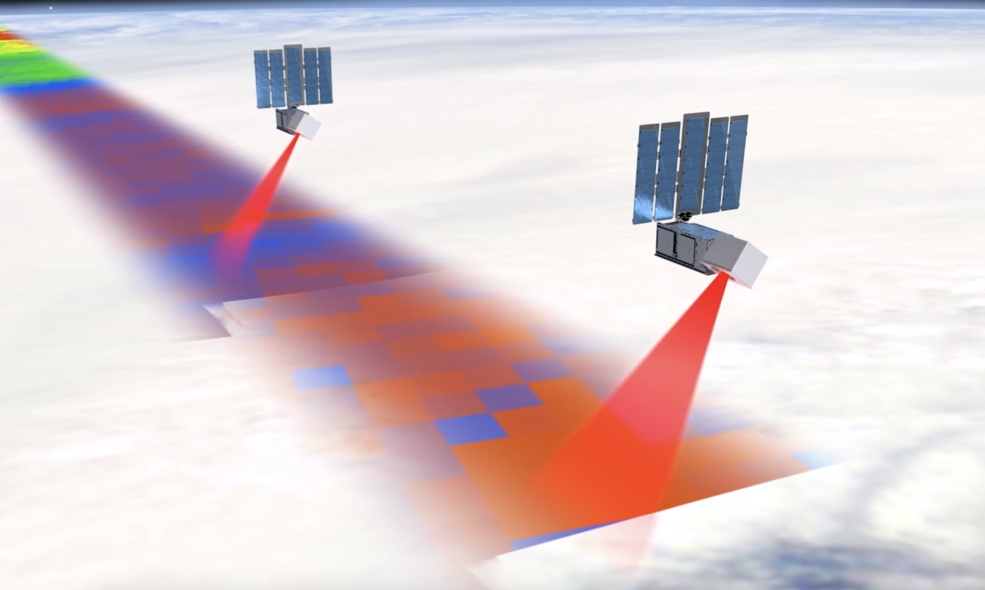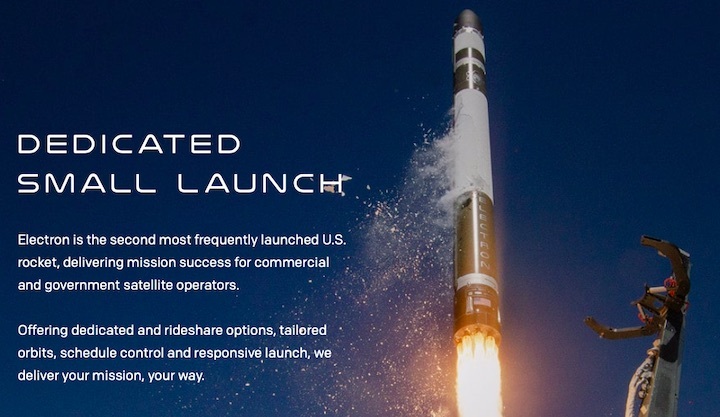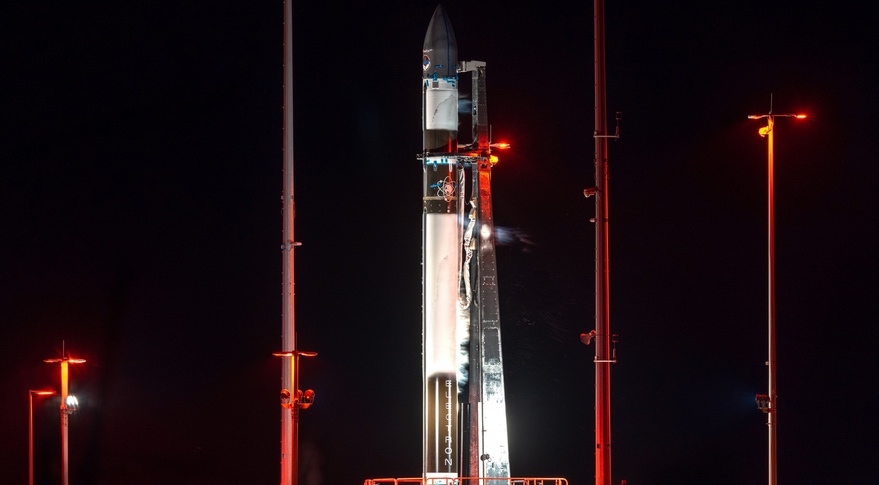25.11.2022
NASA Awards Launch Services Task Order for TROPICS CubeSats Mission

NASA has selected Rocket Lab USA Inc. of Long Beach, California, to provide the launch service for the agency’s Time-Resolved Observations of Precipitation Structure and Storm Intensity with a Constellation of Smallsats (TROPICS) mission, as part of the agency's Venture-class Acquisition of Dedicated and Rideshare (VADR) launch services contract.
Rocket Lab is one of 13 companies NASA selected for VADR contracts in 2022. NASA’s Launch Services Program, based at the agency’s Kennedy Space Center in Florida, manages the VADR contracts. As part of VADR, the fixed-price indefinite-delivery/indefinite-quantity contracts have a five-year ordering period with a maximum total value of $300 million across all contracts.
The TROPICS mission consists of four CubeSats intended for two low-Earth orbital planes and is part of NASA’s Earth System Science Pathfinder Program. Rocket Lab will launch the TROPICS satellites into their operational orbits during a 60-day period (first insertion to final insertion). These two dedicated Federal Aviation Administration (FAA) licensed launches, each on an Electron Rocket are targeted to launch no earlier than May 1, 2023, enabling NASA to provide observations during the 2023 Atlantic hurricane season, which begins June 1.
The TROPICS constellation targets the formation and evolution of tropical cyclones, including hurricanes and will provide rapidly updating observations of storm intensity, as well as the horizontal and vertical structures of temperature and humidity within the storms and in their surrounding environment. These data will help scientists better understand the processes that effect these high-impact storms, ultimately leading to improved modeling and prediction.
Building on NASA's previous procurement efforts to foster development of new launch vehicles for NASA payloads, VADR provides FAA-licensed commercial launch services for payloads that can tolerate higher risk. By using a lower level of mission assurance, and commercial best practices for launching rockets, these highly flexible contracts help broaden access to space through lower launch costs.
Quelle: NASA
+++
NASA Selects Rocket Lab to Launch TROPICS Mission

LONG BEACH, Calif.--(BUSINESS WIRE)-- Rocket Lab USA, Inc. (Nasdaq: RKLB) (“Rocket Lab” or “the Company”), a leading launch and space systems company, today announced it has been selected by NASA to launch the Time-Resolved Observations of Precipitation Structure and Storm Intensity with a Constellation of Smallsats (TROPICS) mission, as part of the agency's Venture-class Acquisition of Dedicated and Rideshare (VADR) launch services contract.
Rocket Lab will launch the TROPICS mission, which is part of NASA’s Earth System Science Pathfinder Program and consists of four CubeSats in two low-Earth orbital planes, into their operational orbit within a 60-day period. These two dedicated missions will launch on Electron rockets from Launch Complex 2 within the Mid-Atlantic Regional Spaceport at NASA Wallops Flight Facility in Virginia. The launches are scheduled to take place no earlier than May 1, 2023.
The TROPICS constellation targets the formation and evolution of tropical cyclones, including hurricanes. TROPICS will provide rapidly updating observations of storm intensity as well as the horizontal and vertical structures of temperature and humidity within the storms and in their surrounding environment. These data will help scientists better understand the processes that effect these high-impact storms, ultimately leading to improved modeling and prediction.
“This year we once again witnessed the devastating effects of hurricanes and tropical storms on lives and livelihoods, underscoring the importance of improved climate data from space to enable scientists and researchers to accurately predict storm strength and give people time to evacuate and make plans,” said Rocket Lab founder and CEO, Peter Beck. “The TROPICS satellites need a responsive and reliable path to orbit to equip people with near real-time, actionable weather data and Rocket Lab is honored to provide a dependable launch solution as we approach the 2023 hurricane season. We look forward to working closely with the team at NASA to deliver mission success once again.”
Forward Looking Statements
This press release may contain certain “forward-looking statements” within the meaning of the Private Securities Litigation Reform Act of 1995, Section 27A of the Securities Act of 1933, as amended, and Section 21E of the Securities Exchange Act of 1934, as amended. All statements, other than statements of historical facts, contained in this release, including statements regarding our expectations of financial results for the third quarter of 2022, strategy, future operations, future financial position, projected costs, prospects, plans and objectives of management, are forward-looking statements. Words such as, but not limited to, “anticipate,” “aim,” “believe,” “contemplate,” “continue,” “could,” “design,” “estimate,” “expect,” “intend,” “may,” “might,” “plan,” “possible,” “potential,” “predict,” “project,” “seek,” “should,” “suggest,” “strategy,” “target,” “will,” “would,” and similar expressions or phrases, or the negative of those expressions or phrases, are intended to identify forward-looking statements, although not all forward-looking statements contain these identifying words. These forward-looking statements are based on Rocket Lab’s current expectations and beliefs concerning future developments and their potential effects. These forward-looking statements involve a number of risks, uncertainties (many of which are beyond Rocket Lab’s control), or other assumptions that may cause actual results or performance to be materially different from those expressed or implied by these forward-looking statements. Many factors could cause actual future events to differ materially from the forward-looking statements in this release, including risks related to the global COVID-19 pandemic; risks related to government restrictions and lock-downs in New Zealand and other countries in which we operate that could delay or suspend our operations; delays and disruptions in expansion efforts; our dependence on a limited number of customers; the harsh and unpredictable environment of space in which our products operate which could adversely affect our launch vehicle and spacecraft; increased congestion from the proliferation of low Earth orbit constellations which could materially increase the risk of potential collision with space debris or another spacecraft and limit or impair our launch flexibility and/or access to our own orbital slots; increased competition in our industry due in part to rapid technological development and decreasing costs; technological change in our industry which we may not be able to keep up with or which may render our services uncompetitive; average selling price trends; failure of our launch vehicles, spacecraft and components to operate as intended either due to our error in design in production or through no fault of our own; launch schedule disruptions; supply chain disruptions, product delays or failures; design and engineering flaws; launch failures; natural disasters and epidemics or pandemics; changes in governmental regulations including with respect to trade and export restrictions, or in the status of our regulatory approvals or applications; or other events that force us to cancel or reschedule launches, including customer contractual rescheduling and termination rights; risks that acquisitions may not be completed on the anticipated time frame or at all or do not achieve the anticipated benefits and results; and the other risks detailed from time to time in Rocket Lab’s filings with the Securities and Exchange Commission (the “SEC”), including under the heading “Risk Factors” in Rocket Lab’s Annual Report on Form 10-K for the fiscal year ended December 31, 2021, which was filed with the SEC on March 24, 2022, and elsewhere (including that the impact of the COVID-19 pandemic may also exacerbate the risks discussed therein). There can be no assurance that the future developments affecting Rocket Lab will be those that we have anticipated. Except as required by law, Rocket Lab is not undertaking any obligation to update or revise any forward-looking statements whether as a result of new information, future events or otherwise
+ ABOUT Rocket Lab
Founded in 2006, Rocket Lab is an end-to-end space company with an established track record of mission success. We deliver reliable launch services, satellite manufacture, spacecraft components, and on-orbit management solutions that make it faster, easier and more affordable to access space. Headquartered in Long Beach, California, Rocket Lab designs and manufactures the Electron small orbital launch vehicle, the Photon satellite platform and the Company is developing the large Neutron launch vehicle for constellation deployment. Since its first orbital launch in January 2018, Rocket Lab’s Electron launch vehicle has become the second most frequently launched U.S. rocket annually and has delivered 152 satellites to orbit for private and public sector organizations, enabling operations in national security, scientific research, space debris mitigation, Earth observation, climate monitoring, and communications. Rocket Lab’s Photon spacecraft platform has been selected to support NASA missions to the Moon and Mars, as well as the first private commercial mission to Venus. Rocket Lab has three launch pads at two launch sites, including two launch pads at a private orbital launch site located in New Zealand and a second launch site in Virginia, USA which is expected to become operational in 2022.
Quelle: RocketLab
----
Update: 27.11.2022
.
Rocket Lab to launch remaining NASA TROPICS satellites

WASHINGTON — NASA has selected Rocket Lab to launch the remaining four cubesats of a constellation to monitor tropical weather systems after the first two were lost in an Astra launch failure.
NASA announced Nov. 23 that it awarded a task order to Rocket Lab through the agency’s Venture-class Acquisition of Dedicated and Rideshare (VADR) contract for the launch of the satellites on two Electron vehicles scheduled for a 60-day period no earlier than May 1, 2023. That schedule would allow the satellites to be ready for the 2023 Atlantic hurricane season.
NASA originally awarded a $7.95 million contract to Astra for launching six of the Time-Resolved Observations of Precipitation structure and storm Intensity with a Constellation of Smallsats (TROPICS) satellites on three of the company’s Rocket 3.3 vehicles. Although each TROPICS satellite is only a 3U cubesat, the three launches were needed to place the satellites into three orbital planes for improved revisit times.
However, the first two TROPICS cubesats were lost in a Rocket 3.3 launch failure June 12. In August, Astra announced it was retiring that vehicle so it could focus on the larger Rocket 4, which will not enter service before late 2023. NASA and Astra later revised the contract for the remaining two launches, which will now be used to launch “comparable scientific payloads” on Rocket 4. The agency said it would procure launches for the remaining satellites through its VADR contract vehicle.
In a break from traditional launch contract announcements, neither NASA nor Rocket Lab would disclose the value of this VADR task order. “Pricing provided in response to launch service task orders under VADR are competed in a closed environment and as such are considered proprietary to the indefinite-delivery/indefinite-quantity contract,” a NASA spokesperson said.
The NASA release stated that, despite the small size of the satellites, the two launches would be dedicated missions, likely because of the specific orbits required by TROPICS. Rocket Lab executives said in a Nov. 9 earnings call that the current average price for an Electron launch is $7 million to $7.5 million.
Virginia launch plans, 2023 projections
The NASA announcement did not disclose where the TROPICS launches would take place. Rocket Lab later said that it will use Launch Complex (LC) 2 at Wallops Island, Virginia, for the two TROPICS launches.
Rocket Lab is gearing up for its first launch from LC-2, carrying three satellites for HawkEye 360, a radio-frequency intelligence company. Rocket Lab announced Nov. 21 it completed the final dress rehearsal for the launch, scheduled for no earlier than Dec. 7. That is dependent on NASA completing certification of the autonomous flight termination system required for the launch, something Rocket Lab said NASA “is continuing to make progress in.”
That will be followed by a second Electron launch from LC-2 in January. Peter Beck, chief executive of Rocket Lab, said that second launch would be for an “undisclosed commercial constellation customer.” One possibility is Capella Space, a company that operates a growing constellation of synthetic aperture radar imaging satellites. A Federal Communications Commission application in September sought a license for telemetry for an Electron launch of the Capella-9 and -10 satellites on an Electron from LC-2 between December 2022 and June 2023.
“We’re looking at what we think will be a pretty impressive growth year on Electron launch cadence” in 2023, said Adam Spice, Rocket Lab’s chief financial officer, during the earnings call. He projected “around 14” Electron launches in 2023. The upcoming inaugural LC-2 launch will be Rocket Lab’s tenth and final Electron launch of 2022.
Of those 14 launches, four to six will take place from LC-2. They will take place “pretty sporadically” through the year, Beck said, perhaps moving into a more regular cadence late in the year as the company and the launch range get used to Electron launches there.
While Rocket Lab says a typical Electron launch generates $7–7.5 million in revenue, there are variations, according to Spice. The company said its most recent launch Nov. 4, which carried a Swedish science satellite, was “heavily subsidized” since it was also a research and development flight to test rocket reusability. The company had intended to try and catch the booster in mid-air as it descended under a parachute, but a loss of telemetry from the falling booster forced the company to call off the attempt and instead recover the booster from the ocean.
Those recovery attempts generate less revenue, he said, since the schedule of the launches is driven by when the company is ready to make another recovery. “We basically try to subsidize the cost of that recovery mission with whatever payloads will fit into that defined timescale,” Spice said. “It’s much more important for us to get the mission off, even if we sell the rocket half-full.”
Spice said the company can generate positive gross margins on its launch business with four full-price launches per quarter. “A lot of good things happen when we’re launching more than once per month.”
However, he said that Rocket Lab is still some time from achieving profitability as it invests in the development of Neutron, its medium-class reusable launch vehicle. “Achieving and sustaining profitability can really only happen once we’ve got the majority of the R&D spending on Neutron in the rear-view mirror.”
Quelle: SN
